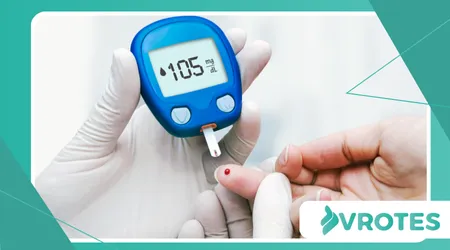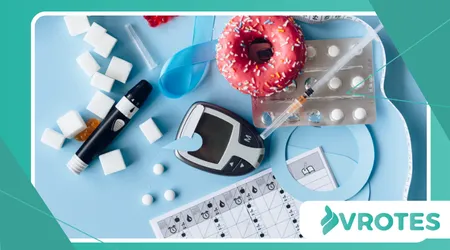Night Sweats: The Hidden Link to Blood Sugar Swings

The sudden, drenching night sweats that disrupt sleep are a hallmark symptom for many navigating the perimenopausal and menopausal journey.
Anúncios
But what if this nightly thermal disturbance is a sign of something more? Many women, and even some men, are discovering a surprising connection.
This article delves into the intricate relationship between hormonal fluctuations, blood sugar regulation, and those unsettling nocturnal episodes.
It’s a conversation that health professionals are increasingly having with their patients.
Beyond the Obvious: Why Hot Flashes Aren’t the Only Culprit
For decades, we’ve been told that hot flashes and night sweats are simply the result of fluctuating estrogen levels.
Anúncios
This explanation, while true, is incomplete. It’s the tip of the iceberg, obscuring a more complex metabolic picture.
The body’s intricate systems don’t operate in silos. They’re a symphony of interconnected processes, and hormonal shifts can disrupt that delicate balance.
When estrogen drops, it can impact insulin sensitivity and glucose metabolism, creating a ripple effect.
This effect can leave you vulnerable to dramatic blood sugar shifts, particularly overnight.
Understanding the Glucose-Hormone Connection
The link between hormones and glucose metabolism is well-established. As estrogen levels decline, the body’s ability to process glucose efficiently can be compromised.
This can lead to insulin resistance, a condition where cells don’t respond properly to insulin.
Read here: Simple Desk Stretches to Relieve Menopausal Tension
Consequently, the pancreas works harder, often leading to a roller coaster of blood sugar highs and lows.
These swings are particularly pronounced during the night when we aren’t eating, forcing the body to rely on its own glucose regulation mechanisms.
The Sympathetic Nervous System’s Role
The sympathetic nervous system, our “fight or flight” response system, is also a major player.
When blood sugar drops too low, a state known as hypoglycemia, the body releases stress hormones like adrenaline and cortisol.
These hormones are meant to trigger the release of stored glucose to raise blood sugar.
However, they also cause an increase in heart rate and blood flow, and they can activate sweat glands.
The resulting feeling is a sudden surge of heat, a rapid heartbeat, and profuse sweating, which many people experience as night sweats.

Blood Sugar Swings: A New Perspective on Night Sweats
Consider the scenario of having a sugary dessert late in the evening. Your blood sugar spikes, and your body releases insulin to bring it down.
However, if your body is struggling with insulin resistance, that insulin release can be overzealous, causing your blood sugar to plummet several hours later while you’re asleep.
Read more: The Truth About Black Cohosh: Benefits and Risks
This is often the precise time when many people wake up drenched in sweat. It’s a physiological alarm bell, alerting you to a potential metabolic issue.
The symptom, in this case, isn’t just a hormonal event; it’s a metabolic one.
For example, Sarah, a 52-year-old marketing executive, had been experiencing severe night sweats for months.
She initially attributed them to menopause. After consulting with her doctor, they decided to monitor her blood glucose.
They discovered that her blood sugar was dropping significantly between 3 and 4 a.m.
By making simple dietary changes—reducing her late-night sugar intake and adding a small, protein-rich snack before bed—her night sweats vanished.
This wasn’t a coincidence; it was a direct result of stabilizing her blood sugar.
A Deeper Look: The Role of Cortisol
Cortisol, the primary stress hormone, also plays a critical role. Normally, cortisol levels are high in the morning to wake us up and low at night to allow for restful sleep.
However, chronic stress, poor sleep, or significant blood sugar swings can disrupt this natural rhythm.
++ Eating to Support Collagen Production After 45
When blood sugar drops at night, the body releases cortisol to raise it, creating a vicious cycle.
This surge of cortisol can cause sweating and interrupt sleep, further exacerbating the problem.
The Evidence: Research and Statistics
A 2023 study published in Menopause: The Journal of The North American Menopause Society found a statistically significant correlation between self-reported hot flashes and night sweats and an increased risk for type 2 diabetes.
The study, involving thousands of women, showed that women who experienced moderate to severe hot flashes and night sweats had a higher prevalence of insulin resistance and metabolic syndrome.
This isn’t just anecdotal; the science is catching up. According to the CDC, approximately 1 in 3 adults have prediabetes, a condition often without obvious symptoms.
Could these nightly drenching episodes be one of the subtle, yet powerful, warning signs? It’s a question worth exploring.
Strategic Approaches to Stabilize Blood Sugar and Reduce Night Sweats
So, what can you do? Managing blood sugar is a proactive step toward getting a better night’s sleep.
Think of your body’s blood sugar regulation system like a thermostat. When the temperature fluctuates wildly, the furnace kicks on and off erratically.
Similarly, wild swings in blood sugar trigger your body’s emergency systems, leading to a physical response. The goal is to keep the “thermostat” stable.

Here are some strategies:
- Balanced Meals: Focus on meals that combine protein, healthy fats, and fiber. This slows down glucose absorption, preventing sharp spikes and subsequent crashes.
- Avoid Late-Night Sugar: That bowl of ice cream or late-night soda can be a direct trigger for a nocturnal blood sugar plunge.
- Incorporate Exercise: Regular physical activity improves insulin sensitivity. It helps your muscles use glucose more effectively, stabilizing levels throughout the day and night.
- Stress Management: Techniques like meditation or deep breathing can lower cortisol, which in turn helps regulate blood sugar.
Here is a simplified table illustrating the impact of various foods on blood sugar:
| Food Category | Blood Sugar Impact | Night Sweat Likelihood |
| Simple Sugars (e.g., Candy, Soda) | High Spike & Rapid Crash | High |
| Complex Carbohydrates (e.g., Whole Grains) | Slow, Steady Rise & Fall | Low |
| Lean Protein (e.g., Chicken, Fish) | Minimal Impact | Very Low |
| Healthy Fats (e.g., Avocado, Nuts) | Minimal Impact | Very Low |
Another example is Michael, a 48-year-old man who struggled with sleep disruptions.
His doctor discovered he was experiencing what’s known as “reactive hypoglycemia” after evening meals.
By shifting his diet to include more whole foods and less processed carbs, his sleep quality improved, and the night sweats disappeared completely.
A Broader View of Menopausal Health
It’s clear that night sweats are not merely a consequence of hormonal shifts. They can be a powerful indicator of underlying metabolic and glucose dysregulation.
By looking beyond the traditional explanations, we can uncover more effective solutions.
This integrated approach to health is not just about managing symptoms; it’s about addressing the root cause.
This perspective empowers individuals to make informed choices that can improve not only their sleep but their overall health.
For those struggling with this symptom, it’s time to ask a new question: are these hormonal, or are they a hidden sign of blood sugar issues?
The answer might change how you approach your health entirely.
Frequently Asked Questions
1. Can stress cause night sweats?
Yes, chronic stress elevates cortisol levels, which can disrupt blood sugar regulation and lead to sweating.
2. Is there a connection between perimenopause, weight gain, and blood sugar?
Absolutely. Hormonal changes in perimenopause can lead to increased insulin resistance and belly fat, which further exacerbates blood sugar instability and can contribute to night sweats.
3. Should I talk to my doctor about my night sweats?
Yes, it is highly recommended. Your doctor can help you determine the underlying cause and create a personalized plan to address it, including checking your blood sugar levels.
4. What is reactive hypoglycemia?
It’s a condition where blood sugar levels drop to an unhealthy low after eating, often a meal high in simple carbohydrates.
This drop can trigger the release of stress hormones, causing symptoms like sweating.
